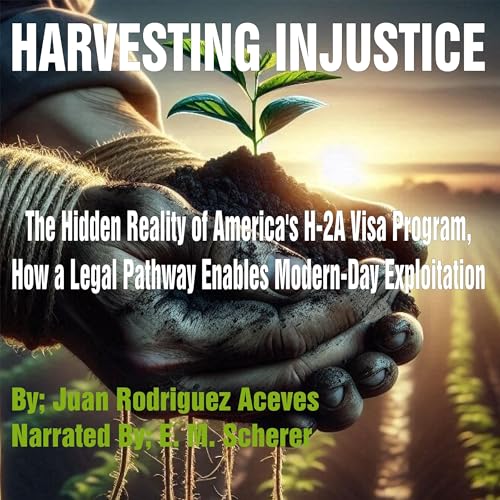
Harvesting Injustice
The Hidden Reality of America's H-2A Visa Program, How a Legal Pathway Enables Modern-Day Exploitation
カートのアイテムが多すぎます
カートに追加できませんでした。
ウィッシュリストに追加できませんでした。
ほしい物リストの削除に失敗しました。
ポッドキャストのフォローに失敗しました
ポッドキャストのフォロー解除に失敗しました
2か月無料体験
聴き放題対象外タイトルです。プレミアムプラン登録で、非会員価格の30%OFFで購入できます。
¥3,100 で購入
-
ナレーター:
-
E. M. Scherer
このコンテンツについて
Every time you bite into fresh strawberries or crisp lettuce, you're connected to a hidden world of agricultural workers whose stories remain untold.
Harvesting Injustice exposes how America's H-2A visa program—designed to protect temporary agricultural workers—has become a sophisticated mechanism for legal exploitation.
Drawing from his family's multigenerational experience with agricultural labor programs, author Juan Rodriguez Aceves reveals the invisible chains binding hundreds of thousands of workers who feed America. His grandfather and father participated in the Bracero Program sixty years ago; today, he witnesses how legal frameworks still enable systematic abuse through economic dependency, geographic isolation, and cultural barriers.
His investigation reveals how employers use sophisticated legal strategies to maintain worker control while technically complying with federal regulations.
This is not another academic study gathering dust on shelves. Harvesting Injustice speaks directly to Americans who care about human dignity but don't understand how daily food choices connect to worker welfare.
Rodriguez Aceves transforms complex policy into compelling human stories while providing practical guidance for consumers, voters, and community members who want to create change.
The book exposes hidden subsidies making cheap food possible through worker exploitation, examines successful international models proving alternatives exist, and empowers listeners with concrete actions—from ethical consumption to community advocacy—that generate real impact.
His writing combines analytical rigor from his accounting background with moral authority from living the immigrant experience and witnessing systematic injustice firsthand.
In an era when food security, immigration policy, and human rights increasingly intersect, this book provides essential knowledge and tools for creating agricultural systems serving both
economic efficiency and human dignity.



